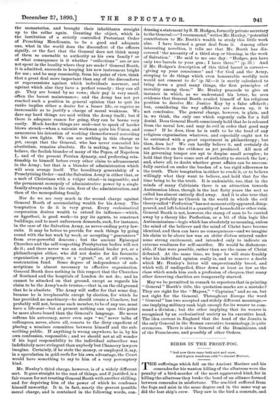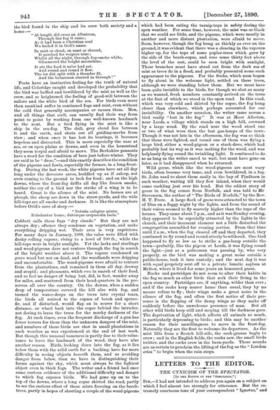BIRDS IN THE FROST-FOG.
"And now there came both mist and snow, And it grew wondrous cold."—Ancient Mariner.
THE sufferings which fell on the Ancient Mariner and his comrades for his wanton killing of the albatross were the penalty of a bird-murder of the most aggravated kind, for in killing the albatross they broke the bond of an alliance formed between comrades in misfortune. The sea-bird suffered from the fogs and mist in the same degree and in the same way as did the lost ship's crew. They saw in the bird a comrade, and
the bird found in the ship and its crew both society and a home :— "At length did cross an Albatross, Through the fog it came; As it had been a Christian soul We hailed it in God's name.
In mist or cloud, on mast or shroud, It perched for vespers nine ; Whilst all the night, through fog-smoke white, Glimmered the bright moonshine.
It ate the food it ne'er had eat, And round and round it flew.
The ice did split with a thunder fit, And the helmsman steered us through!"
Poets have an instinctive feeling for the truth of natural life, and Coleridge caught and developed the probability that the bird was baffled and bewildered by the mist as well as the crew, and so heightened the feeling of good-will between the sailors and the white bird of the sea. For birds even more than mankind suffer in continued fogs and mist, even without the cold that generally accompanies or causes them. Men, and all things that walk, can usually find their way from point to point by working from one well-known landmark to the next. But a bird flying in the mist is like a ship in the sea-fog. The dull, grey cloud lies between it and the earth, and shuts out all guiding-marks from view ; and when once it has lost its bearings, it becomes hopeless and distracted. This is more especially the case at sea, or on open plains or downs, and even in the homestead they seem torpid and afraid to move. The Berkshire peasants have a word for the condition of bees just before winter. They are said to be " droo,"—and this exactly describes the condition of the pigeons and fowls, especially the former, in a long frost- fog. During the last week, the white pigeons have sat all day long under the dovecote eaves, huddled up as if asleep, not even coming to the ground to look for food; and on the high downs, where the frost-fog drifts all day like frozen smoke, neither the cry of a bird nor the stroke of a wing is to be heard. Great is the silence of the mist. No horses are at plough, the sheep are down in the straw-yards, and the wide hill-tops are all smoke and darkness. It is like the atmosphere before Ovid's cave of sleep :— "Nebuls3 caligine mixtte Exhalantur humo, dubinque crepuscula, lucis."
Cobbett calls these fogs " dry clouds." But they are not always dry ; oftener they condense on vegetation, and make everything dripping wet. Their area is very capricious. For many days in January, 1888, the vales were filled with dusky rolling vapour, rising to a level of 700 ft., while the hill-tops were in bright sunlight. Yet the larks and starlings and wood-pigeons dare not venture through the fog in search of the bright weather above it. The vapour condensed on green wood but not on dead, and the woodlands were dripping and uncomfortable. The wood-pigeons were afraid to venture from the plantations, and remained in them all day, drowsy and stupid ; and pheasants, which run in search of their food, and so feel no danger of being lost, did, in fact, wander away for miles, and scattered from their head-quarters in the pre- serves all over the country. On the downs, when a sudden drop of temperature covered the hill also with fog, and turned the water-drops on the trees into crystal tears, the birds all retired to the copses of beech and spruce- fir, and if disturbed, would flap on in scores for a short distance, or wheel back into the copse behind the intruder, not daring to leave the trees for the murky darkness of the fog. At such times, even the frequent discharge of a gun has fewer terrors for them than the unknown dangers of the mist, and numbers of these birds are shot in small plantations in such weather as was experienced at the end of last week. But though this unusual tameness is partly due to their reluc- tance to leave the landmark of the wood, they have also another reason. Birds, looking down into the fog, as it lies below them with the solid earth for a backing, have far more difficulty in seeing objects beneath them, and so avoiding danger from below, than we have in distinguishing their forms against the sky, which must always be the lightest object even in thick fogs. The writer and a friend had once some curious evidence of the additional difficulty and danger to which fog exposes birds. We had gone up on to the top of the downs, where a long copse skirted the road, partly to see the curious effect of these mists freezing on the beech- trees, partly in hopes of shooting a couple of the wood-pigeons
which had been eating the turnip-tops in safety during the open weather. For some time, however, the mist was so black- that we could see little, and the pigeons, which were mostly in. another and more distant plantation, were afraid to move. Soon, however, though the fog hung as thickly as ever on the ground, it was evident that there was a clearing in the vapours• higher up, for the tops of some poplar-trees which grew by the side of the beech-copse, and rose some thirty feet above- the level of the rest, could be seen bright with sunlight.. These branches must have stood out from the dark sea of mist as trees do in a flood, and probably presented some such appearance to the pigeons. For the flocks, which soon began to fly about in the welcome light, settled on these trees,. although we were standing below them. Bnt we must have- been quite invisible to the birds, for though we shot as many- as we wanted, fresh numbers constantly arrived on the trees at the foot of which we stood in the open road. In this road, which was very cold and skirted by the copse, the fog hung closer than elsewhere, which perhaps accounted for our invisibility. On another occasion, the writer came across a bird really "lost in the fog." It was at Moor Allerton, near Leeds, a village which stands on a high hill, crowned by a large wood. By the road near the wood stood one or two of what were then the last gas-lamps of the towr.- Though it was not late in the afternoon, the fog was so thick that these were lighted, and round one of them was flying a large bird, either a wood-pigeon or a stock-dove, which had probably lost its way as it was making for the wood, and was helplessly flying round the twinkling light. It continued to do• so as long as the writer cared to wait, but must have gone on later, as it had disappeared when he returned.
Wild geese, which like the wood-pigeons are most wary birds, often become very tame, and even bewildered, in a fog-. St. John used to shoot them easily in the bay of Findhorn iir such weather, waiting till they flew inland, when they would. come cackling just over his head. But the oddest story of geese in the fog comes from Norfolk, and was told to Mr Stevenson, the author of " The Birds of Norfolk," by the Rev.. H. T. Frere. A large flock of geese were attracted to the town of Dies on a foggy night by the lights, and from the sound of their voices seemed to fly scarcely higher than the tops of the houses. They came about 7 p.m., and as it was Sunday evening, they appeared to be especially attracted by the lights in the• church, and their incessant clamour not a little disturbed the congregation assembled for evening service. From that time- until 2 a.m., when the fog cleared off and they departed, they- continued to fly round and round utterly bewildered. One bird happened to fly so low as to strike a gas-lamp outside the- town—probably, like the pigeon at Leeds, it was flying round. the light—just as a policeman was passing by, who very properly, as the bird was making a great noise outside a public-house, took it into custody ; and the next day it was with equal propriety sent off to a private lunatic asylum at Melton, where it lived for some years an honoured guest.
Rooks and partridges do not seem to alter their habits in the fog so much as other birds that seek their living in the• open country. Partridges are, if anything, wilder than ever ; and if the rooks keep nearer home than usual, they by no means refuse to fly ; their wings make a great noise in the- silence of the fog, and often the first notice of their pre- sence is the flapping of the damp wings as they make off" suddenly before the unwelcome presence of man. But all, other wild birds keep still and moping till the darkness goes. The deprivation of light, which affects all animals so much. is particularly depressing to birds ; and this may be another- reason for their unwillingness to move in the frost-fog.. Naturally they are the first to welcome its departure. As the mist lifts from a Scotch hill-side, the cock-grouse begin to- crow ; and in the English fields, the rooks caw, the small birds- twitter, and the cocks crow in the barn-yards. These sounds are as certain to proclaim the lifting of the fog as the " London cries " to begin when the rain stops.



































 Previous page
Previous page